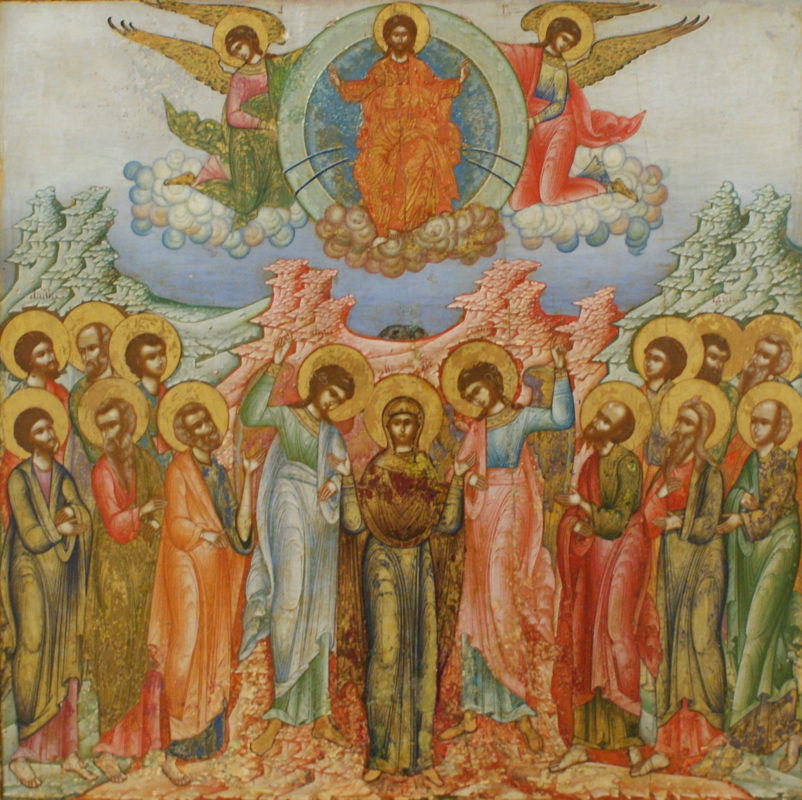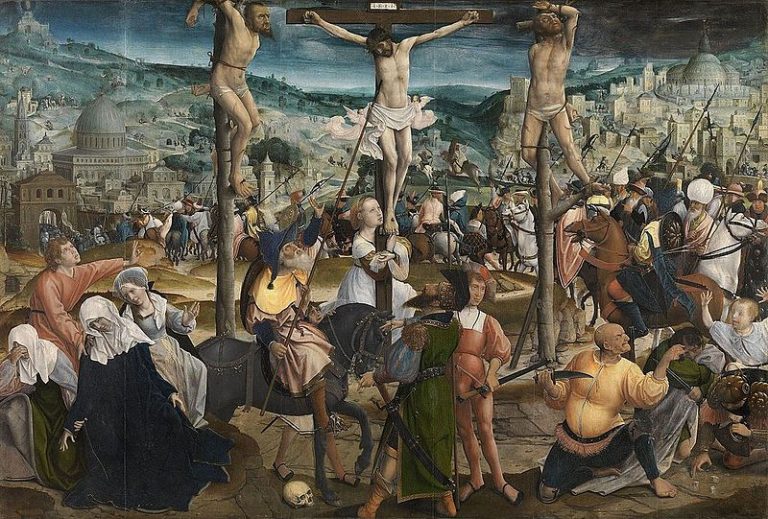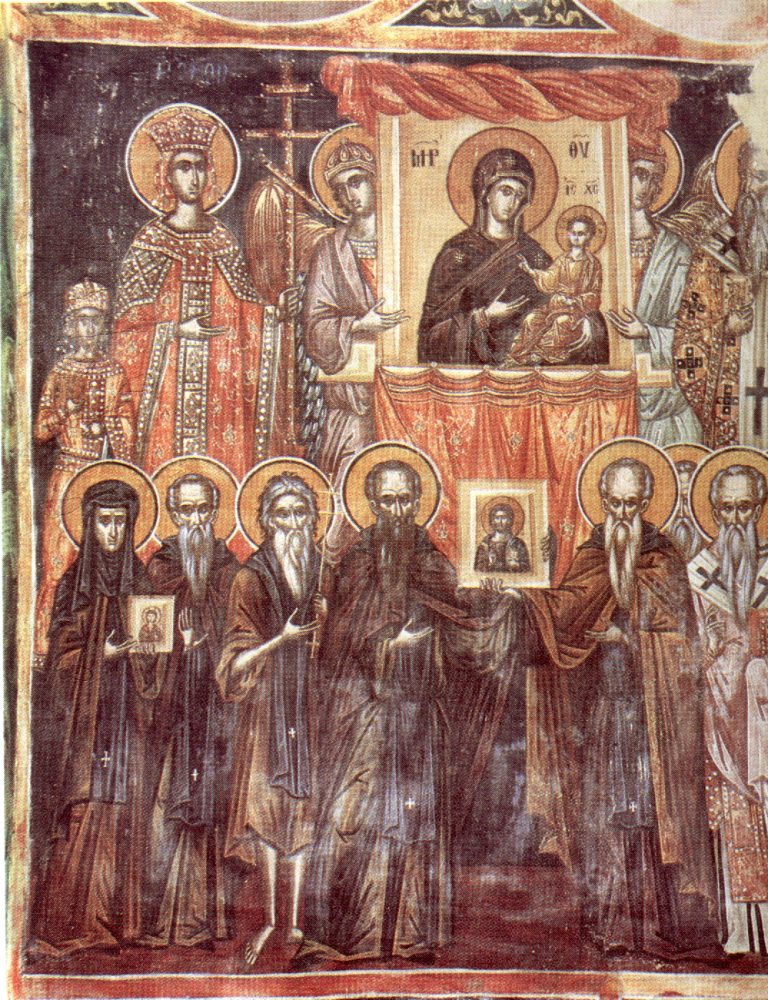The Ascension and the last commandment of the Risen One
It is irrefutably accepted that the last words of a man – in his right mind – on earth, just before he closes his eyes once and for all, are the sum of the experiences, knowledge and efforts he has gained from the long and varied course of his life. Surely the last movements, facial expressions and advice of a loved one are etched in our memory and heart as a last-ditch effort to survive our intermittent relationship due to tragic death. In a similar way, the final act of the plan of the Divine Economy of our Lord Jesus Christ, the Ascension, and His final exhortation to His disciples (and by extension to all of us), the Mission, cannot leave us indifferent. On the contrary, they ought to swirl in our minds, shape our character, regulate our heartbeats, guide our steps, and direct our lives. Just before His saving passion and hopeful resurrection, the Lord warns the disciples: “begin to sing. But see yourselves: for deliver ye yourselves unto me in councils, and in the synagogues thereof ye shall be troubled, and ye shall stand before rulers and kings in the presence of me in witnessing unto them. And in all nations see the gospel preached first.”
1. Then, the same Evangelist reflects the commandment that the Lord left us as a sacred legacy between the climactic events of His Resurrection and His Ascension: “Going into the world in answer, preach the gospel to all creation. He that believeth and is baptized shall be saved, and he that believeth not shall be condemned. And as many as believe have attended these things: in my name shall demons be cast out; they shall speak with tongues, and they shall speak with mouths; they shall not press any thing to death, lest it hurt them; they shall lay hold on sick hands, and shall do good. Finally, he notes: “῾The Lord, after the lamentation, ascended into heaven, and sat down at the right hand of God. And they that went forth proclaimed everywhere, with the Lord’s cooperation, and testifying to the word by the following signs.” 2. Ο Ματθαίος από την πλευρά του καταγράφει τα τελευταία θεία λόγια ως εξής: «καὶ προσελθὼν ὁ ᾿Ιησοῦς ἐλάλησεν αὐτοῖς λέγων· ἐδόθη μοι πᾶσα ἐξουσία ἐν οὐρανῷ καὶ ἐπὶ γῆς. πορευθέντες μαθητεύσατε πάντα τὰ ἔθνη, βαπτίζοντες αὐτοὺς εἰς τὸ ὄνομα τοῦ Πατρὸς καὶ τοῦ Υἱοῦ καὶ τοῦ ῾Αγίου Πνεύματος, διδάσκοντες αὐτοὺς τηρεῖν πάντα ὅσα ἐνετειλάμην ὑμῖν· καὶ ἰδοὺ ἐγὼ μεθ᾿ ὑμῶν εἰμι πάσας τὰς ἡμέρας ἕως τῆς συντελείας τοῦ αἰῶνος»
3. Ο δε Λουκάς, τρίτος των Συνοπτικών, αφού υπογραμμίζει τις προτροπές του Θεανθρώπου «κηρυχθῆναι ἐπὶ τῷ ὀνόματι αὐτοῦ μετάνοιαν καὶ ἄφεσιν ἁμαρτιῶν εἰς πάντα τὰ ἔθνη, ἀρξάμενον ἀπὸ ῾Ιερουσαλήμ. ὑμεῖς δέ ἐστε μάρτυρες τούτων»
4, recounts the event of the Ascension: “And he brought them out to Bethany, and with his hands he blessed them. And it came to pass in blessing them that he passed from them and was carried up into heaven. 5. The last words of Jesus are also recorded by the evangelist Luke in the Book of Acts: “Receive ye power through the coming of the Holy Ghost upon you, and be ye witnesses unto me in Jerusalem, and in all Judea and Samaria, and unto the end of the earth.” 6. Η παραπάνω τετραπλή αναφορά στη στερνή παραίνεση του Κυρίου προς τους μαθητές Του αποτελεί, αναμφισβήτητα, υλοποίηση της προφητείας του Ησαία για την Οικουμενικότητα του ευαγγελίου: «τέθεικά σε εἰς φῶς ἐθνῶν τοῦ εἶναί σε εἰς σωτηρίαν ἕως ἐσχάτου τῆς γῆς»
7. “Earth” was the last word the Lord used while He was still treading our soil. With the name of the earth on his lips, as if he were bidding it farewell, he ceased to be visible in the physical, the earthly frequency 8” “And these things were seen by those who saw them, and a cloud came upon him out of their eyes.” 9, which is why the hymn writer notes: “He that filleth the universe saith unto the disciples in the mountain of the Mount of Olives, My friends, the time of the rising is come; ye have gone forth, ye have taught the nations the word which ye have heard, from the voice of Emma. Then was he taken up in glory, as on a chariot: whereupon the apostles were troubled.” 10. «Καὶ ὡς ἀτενίζοντες ἦσαν εἰς τὸν οὐρανὸν πορευομένου αὐτοῦ καὶ ἰδοὺ ἄνδρες δύο παρειστήκεισαν αὐτοῖς ἐν ἐσθῆτι λευκῇ, οἳ καὶ εἶπον· ἄνδρες Γαλιλαῖοι, τί ἑστήκατε ἐμβλέποντες εἰς τὸν οὐρανόν; οὗτος ὁ ᾿Ιησοῦς ὁ ἀναληφθεὶς ἀφ᾿ ὑμῶν εἰς τὸν οὐρανόν, οὕτως ἐλεύσεται, ὃν τρόπον ἐθεάσασθε αὐτὸν πορευόμενον εἰς τὸν οὐρανόν»
11. Studying the event, the hymn writer is prompted to exclaim: “We, what have you stood, looking up to heaven? the angels who were watching, as men, spoke in the Mysteries of the Word; this that you saw, under a bright cloud, ascended, this is the way you saw, judging the world, as you went forth, walking in answer, doing the things that were spoken” 12 The Ascension – of which we have quoted above the irrefutable testimonies of the Evangelists – is directly related to the decisive event of the Resurrection for humanity, since “The glorious Ascension of the Risen Lord in heaven is a firm proof and solemn confirmation of His Resurrection, which is the foundation of our faith”, 13: “He raised his hands and blessed them, to show them his whole self unharmed and unharmed, to present his feet, which had endured the piercings of the nails, sturdy and capable of a steady course, to show his hands likewise nailed to the cross, that linen side, which bore the marks of the wounds, in order to confirm the saving passion” 14. And as with the Ascension the event of the Resurrection is exploited, the plan of the Divine Economy is completed. What more can our heart thirsty for God ask?” 15.

In a similar way, John Chrysorremon interprets the event of the Ascension and emphasizes its beneficial effects: “The Saviour came and came and brought the Holy Spirit, and went up and lifted up to heaven a holy body, that the world might receive the pledge of salvation, the power of the Holy Spirit. Heaven received the holy body, and the earth received the holy spirit.” 16. Αλήθεια όμως, τι σημαίνει η Ανάληψη για εμάς και για το ιεραποστολικό έργο που με την χάρη και το έλεος του Θεού επιχειρούμε να διακονήσουμε; Μίμηση Χριστού. Ο Γρηγόριος ο Παλαμάς σχολιάζει χαρακτηριστικά τη σχέση ανάμεσα στην αγία βιωτή του Χριστού και στον προορισμό ανθρώπου: «Διότι ήλθε δια σαρκός όχι άγγελος ούτε άνθρωπος, αλλά ο ίδιος ο Κύριος, και μας έσωσε, γενόμενος άνθρωπος σαν εμάς για μας και μένοντας αναλλοιώτως Θεός. Όπως δε κατήλθε, όχι μεταβαίνοντας αλλά συγκαταβαίνοντας, έτσι επανέρχεται πάλι, όχι μεταβαίνοντας με την θεότητα, αλλά ενθρονίζοντας άνω την φύσι μας που ανέλαβε. Διότι αληθινά εκεί έπρεπε να προσφερθή στον Θεό η πρωτότοκος εκ των νεκρών φύσις μας σαν είδος απαρχής πρωτογεννημάτων υπέρ του γένους ολόκληρου… και όποιον βίο έζησε, για εμάς τον έζησε, φανερώνοντας μας δρόμο που επαναφέρει στην αληθινή ζωή και όσα έπαθε με την σάρκα, για μας τα έπαθε, για να θεραπεύση τα πάθη μας, και για τις δικές μας αμαρτίες ωδηγήθηκε σε θάνατο, και για μας αναστήθηκε και αναλήφθηκε, προετοιμάζοντας σε μας την ανάστασι και ανάληψι σε άπειρους αιώνες, διότι όλοι οι κληρονόμοι αυτής της ζωής μιμούνται κατά το δυνατό την πολιτεία της επί της γης αποστολής Του» 17. Ταπείνωση και αγάπη. «Εάν, λοιπόν, ο Θεός υπερύψωσε τον Χριστό του επειδή ταπεινώθηκε, εξευτελίσθηκε, υπέφερε και υπέμεινε επονείδιστο σταυρικό θάνατο για χάρη μας, πως θα σώσει και θα δοξάσει και θα ανυψώσει εμάς, εάν δεν επιλέξουμε την ταπείνωση, εάν δεν δείξουμε αγάπη προς τους συνανθρώπους μας, εάν δεν κερδίσουμε τις ψυχές μας με την υπομονή στους πειρασμούς, εάν δεν ακολουθούμε δια της στενής πύλης και οδού που οδηγεί στην αιώνια ζωή, αυτόν που μας καθοδήγησε σ’ αυτήν για την σωτηρία μας;» 18. Να εκλάβουμε τον υπόλοιπο χρόνο της ζωής μας ως «πίστωση χρόνου» ως «στάδιον αγώνος ευσεβούς». «Το χρονικό διάστημα που παρεμβάλλεται μεταξύ της Αναλήψεως του Χριστού και της δευτέρας και ενδόξου Αυτού παρουσίας, η περίοδος δηλαδή κατά την οποία ζούμε, είναι και πρέπει να γίνει, περίοδος ιεραποστολής είναι μία πίστωση χρόνου, που χορηγεί ο Θεός για να ακουσθεί το «Ευαγγέλιον», η χαρμόσυνη είδηση της σωτηρίας του ανθρώπου, σε όλα τα σημεία της γης για να μπορέσουν έτσι όλοι οι πιστοί να εισέλθουν στη βασιλεία του Θεού, την Εκκλησία του» 19. Συνεχής καλλιέργεια. Τέλος, αυτό που «ωθεί τον ιεραπόστολο να φθάσει στα πέρατα της γης δεν είναι μόνον ο κίνδυνος μήπως κάποιος εκλεκτός του Θεού μείνει έξω από τη βασιλεία του, αλλά και η φροντίδα για τους ασθενείς συνανθρώπους μας, των οποίων η πίστη και η ελπίδα ενδέχεται να ψυχρανθούν ή και να εκλείψουν, λόγω της καθυστερήσεως της ενδόξου παρουσίας του Κυρίου» 20. Η μνήμη της εορτής τιμάται 39 ημέρες μετά το Πάσχα εκάστου έτους.
Echo d’.
Thou art taken up in glory, O Christ our God, rejoicing in the disciples, the promise of the Holy Ghost, assuring them by the blessing that thou art the Son of God, the redeemer of the world.
References
- Mark. 13:9-10
- Mark. 16. 15:20
- Matt. 28:18-20
- Luke. 24:47-48
- Luke. 24:50-51
- Prax. 1:8
- Isaiah. 49,6
- .
- Prax. 1:9
- Pentecost, published by “Apostolic Deaconry of the Church of Greece”, Athens 2002, p. 414
- Prax. 1:8-11
- Pentecost, ed.”Apostolic Deaconry of the Church of Greece”, Athens 2002, p. 417.
- Stergios Sakkou, The Ascension of the Lord, ed.”Christian Hope”, Thessaloniki 2009, p. 8
- Gregory Palamas, To the Ascension of the Lord, E.E.E., 10,28-30
- Stergios Sakkou, The Ascension of the Lord, “Christian Elpis”, Thessaloniki 2009, p. 15
- Venedictus Ieromonachos, Chrysostomic Fund, published by the “Synod of Spyridon Ieromonachos”, Mount Athos 2002, p. 145
- Βενεδίκτου Ιερομονάχου, Παλαμικόν Ταμείον, εκδ.«Συνοδία Σπυρίδωνος Ιερομονάχου», Άγιο Όρος 2007, σσ. 128-129
- Στεργίου Σάκκου, Η Ανάληψη του Κυρίου, εκδ.«Χριστιανική Ελπίς», Θεσσαλονίκη 2009, σσ. 98-99
- Χρίστου Κρικώνη, Πατερικά Μελετήματα, εκδ.«University studio press», τ. 2, Θεσσαλονίκη 2001, σ. 273
- Χρίστου Κρικώνη, Πατερικά Μελετήματα, εκδ.«University studio press», τ. 2, Θεσσαλονίκη 2001, σ. 274





